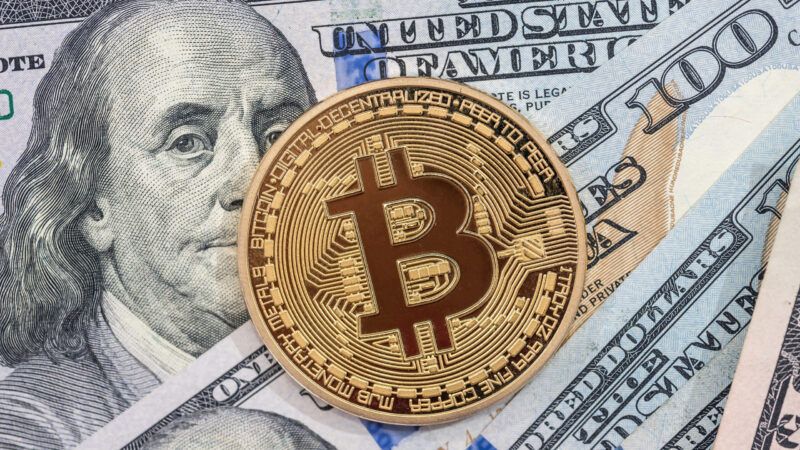Bitcoin in Retirement Accounts Could Be a Good Idea
Trump’s executive order directs the Labor Department to loosen rules on retirement accounts, potentially shifting trillions in savings toward higher-return, but riskier assets like bitcoin.

Americans' 401(k)s add up to around $10 trillion total—equivalent to about 10 percent of all publicly listed stocks and bonds in the U.S., and almost twice what the federal government spends in a year. It's no surprise, then, that every industry or special interest wants a piece of that juicy retirement money.
With aging populations and a heavier emphasis on saving for retirement in the U.S., getting access to largely passive pension money is the wet dream of every asset manager, financial adviser, or industry mergers and acquisitions consultant.
On August 7, President Donald Trump issued an executive order to allow "private equity, real estate, cryptocurrency and other alternative assets in 401(k)s," reported Bloomberg, making it easier for some 80 million Americans to hold nonstandard assets in their tax-deferred retirement plans.
A 401(k) diverts a portion of an employee's wages, often matched by the employer, into a specific account where the employee can choose which assets are held and in what allocation—often mutual funds, broad stock market exchange-traded funds (ETFs), or high-yield bond portfolios. The tax-deferred account is efficient for everyone involved: The employee can save for retirement using pretax money, and the employer has a tax incentive to match the contribution.
According to Tephra Digital, an investment firm that focuses on digital assets, only a few U.S. asset managers allow unrestricted access to bitcoin ETFs. Trump's executive order tasks the Department of Labor with updating guidance and minimum standards for appropriate investment access in retirement accounts "subject to the Employee Retirement Income Security Act of 1974," reported Jennifer A. Dlouhy and Allison McNeely for Bloomberg.
Bitcoin, real estate—including real estate investment trusts—and private equity are all asset classes that have outperformed the S&P 500.
Since Fidelity experimented with allowing bitcoin in 401(k)s over three years ago, and the idea first made noise in the personal finance world, bitcoin has returned 215 percent—compared to about 54 percent for the S&P 500. Even the Magnificent Seven stocks, which constitute the bulk of positive returns in the S&P 500, are only up about 150 percent since then.
Private equity has usually posted a couple of percentage points of excess returns compared to public markets, so it's no surprise that pension fund managers are keen to have this asset class in their portfolios, or those of their clients.
Over almost any time period, bitcoin is the best-performing asset in the world—the longer the comparison period, the more favorably it ranks. Thus, holding it in the longest-term pools of capital is efficient and beneficial. Universities, including Brown University, Emory University, Harvard University, and the University of Austin, figured this out years ago, adding bitcoin to their endowment portfolios. Others, including the University of Pennsylvania and the University of California, Berkeley, have also received large bitcoin donations.
It is reasonable to be skeptical of Trump and cryptocurrency, especially in light of his self-enriching schemes. The $Trump and $Melania memecoins, conveniently launched days before his inauguration, and the Trump family's involvement in World Liberty Financial both raise valid concerns about conflicts of interest while allowing him (and his family) to profit from his presidential influence with minimal regulatory oversight. But the executive order is still a clever proposal. Many Americans face uncertain retirement prospects, as public programs are unlikely to be there for them in old age. Their meager savings, inside and outside retirement accounts, are often too small to support their accustomed lifestyles. Holding assets with higher returns is one way out of this conundrum.
To critics, the idea smells like yet more insider dealing, coupled with suspicious off-loading of risks to ordinary Americans who are just trying to save for retirement. But like it or not, retirement money is passively finding its way into bitcoin anyway.
Tesla, which has held bitcoin since 2021, has been part of the S&P 500 index for years. Coinbase, the cryptocurrency exchange, recently committed to building a larger bitcoin stack and joined the S&P 500 in May. Block, the payment processing company behind Square and Cash App, is the 12th-largest corporate holder of bitcoin and joined the S&P 500 last month.
The bitcoin behemoth Strategy, led by Michael Saylor, is by far the largest corporate holder of bitcoin and will quite likely join the S&P 500 in the near future. Since the firm's explicit business model these days is to hoover up funds from the traditional financial market to buy more bitcoin, any passive flow from retirement funds will end up in bitcoin, via the wrapper of the company's shares.
Whether you like bitcoin or not, and even though Trump's dealings seem self-serving and catering to special interests, bitcoin is part of America's financial present and future. Making it easier to hold in retirement accounts just strips out the middleman.


Show Comments (27)